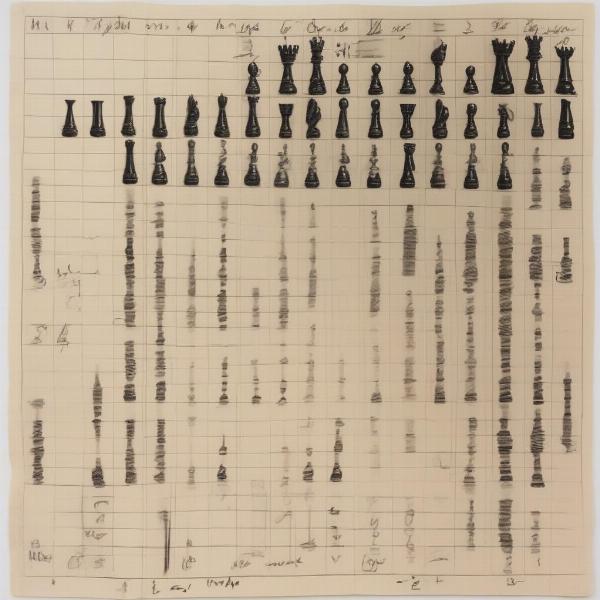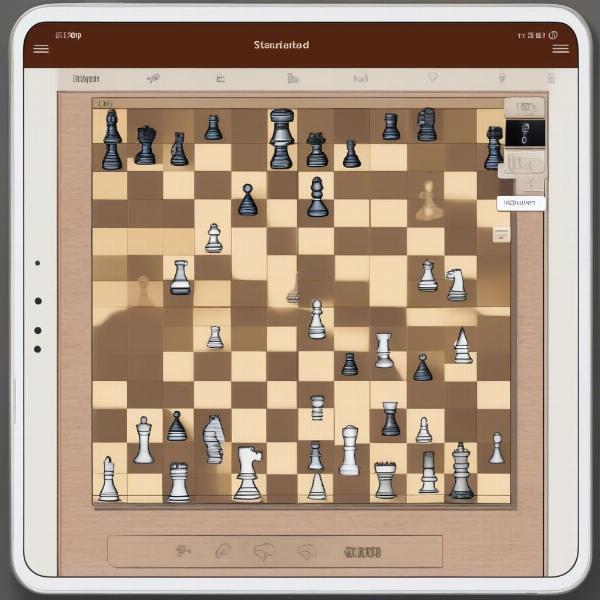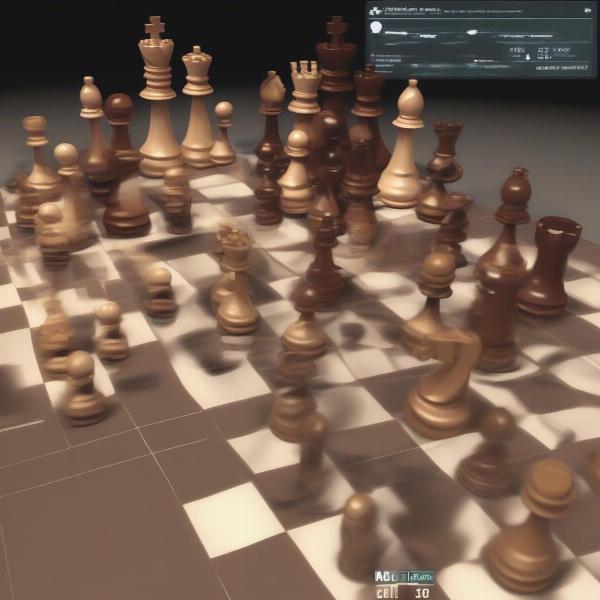Recording chess games is crucial for improving your play, analyzing your strategies, and sharing memorable matches with others. Here at SupremeDuelist.blog, we understand the importance of this process, whether you’re a casual player or a seasoned tournament competitor. This article will explore the various methods available to effectively record your chess games, offering insights into which options might suit you best.
From traditional notation to modern digital tools, there are numerous ways to preserve the intricacies of a chess encounter. We’ll delve into the specifics of each method, discuss their advantages and disadvantages, and help you determine the best approach to elevate your chess journey. By understanding these methods, you can unlock new avenues for chess analysis and growth.
Understanding the Importance of Chess Game Recording
Why bother recording your chess games at all? The benefits extend far beyond simply having a record of moves. Analyzing past games is one of the most powerful tools a chess player has to improve. By meticulously reviewing your games, you can identify patterns in your play, recognize errors you might be repeating, and refine your strategic thinking. Recording allows you to learn from both your victories and defeats, promoting continuous progress. Moreover, recording allows you to share your games with a coach or chess community for insightful feedback.
Furthermore, recording chess games is not just for serious players. Many chess enthusiasts enjoy revisiting exciting games they have played, reliving the drama and strategic depth. Recorded games also serve as historical records of personal chess journeys, reflecting growth over time. In essence, by using the correct approach for the game, you are creating a learning experience for now and for the future.
Key Benefits of Recording Chess Games:
- Improvement: Identify weaknesses and recurring mistakes.
- Analysis: Analyze strategic decisions and tactical patterns.
- Learning: Study both your wins and losses to boost your chess understanding.
- Sharing: Show your games with coaches, friends, or chess clubs.
- Memory: Preserve important or interesting matches.
- Personal Records: Keep a log of your progress and achievements over time.
 traditional-chess-notation-example
traditional-chess-notation-example
Traditional Chess Notation: The Pen and Paper Approach
The most established method of recording chess games is by using algebraic notation. This system, which uses a combination of letters and numbers to identify each square on the board, has been around for centuries and is still widely used today. While it may seem a bit daunting at first, mastering algebraic notation is a valuable skill for any chess player.
How Algebraic Notation Works:
- Each square is identified by a letter (a-h) for the file (column) and a number (1-8) for the rank (row).
- White’s pieces start on ranks 1 and 2, and black’s pieces begin on ranks 7 and 8.
- Moves are recorded using piece symbols (K for king, Q for queen, R for rook, B for bishop, and N for knight) followed by the destination square.
- Pawn moves are recorded without piece symbols, using only the destination square.
- Special notations exist for captures (x), castling (0-0 or 0-0-0), check (+), and checkmate (#).
Recording your games using pen and paper might seem a bit old-fashioned but it has its advantages. It is reliable and does not require any technology. It’s also a great way to sharpen your focus and engage with the game on a deeper level. However, the speed and accuracy of this method rely on your proficiency in notation, and it can be prone to errors that will need to be corrected later on. It can also be less convenient to store and share digital records.
“Traditional algebraic notation is the bedrock of chess recording,” says Dr. Anya Petrova, a chess historian and renowned chess coach. “While newer methods exist, understanding this fundamental system is essential for serious chess players.”
Digital Tools for Recording Chess Games
In today’s digital age, numerous tools are available that make recording chess games more efficient and convenient. These tools range from simple apps to more sophisticated chess databases that provide advanced analysis features.
Chess Apps and Websites:
- Online Chess Platforms: Sites like Chess.com, Lichess.org, and others offer built-in game recording features, along with automated analysis tools.
- Dedicated Chess Recording Apps: Numerous mobile apps allow you to input and record moves, often with additional features like engine analysis and sharing capabilities.
- Chess Database Software: Software such as ChessBase and Scid vs. PC provide powerful tools for game recording, analysis, and storage.
These digital tools often integrate with chess engines, which allows for a detailed analysis of your recorded games and can highlight tactical mistakes and strategic possibilities. They also offer easy ways to share your games, whether it’s with friends or coaches for review. They also allow for immediate correction in case of a mistake during record taking, and many even give the option for move prediction. However, they can be dependent on battery life or internet connections to be fully functional, and are often limited to devices.
 digital-chess-recording-app-screenshot
digital-chess-recording-app-screenshot
Using Voice Recording for Chess Games
An often overlooked but viable method for recording chess games is voice recording. This can be a very useful approach when playing on the go, or when you want to capture your thought process during your matches. Voice recording can either be for transcribing later, or for a personal recording of the thought process during the match, as part of a study process.
How Voice Recording Works:
- Use a smartphone, digital recorder, or any other recording device.
- Verbally announce each move using algebraic notation or your own simplified method.
- Transcribe the recorded moves later or analyze the recording for thought process insights.
The greatest advantage is ease of use. You do not have to worry about paper or app manipulation. It allows for a hands-free method and can be great if you want to focus more on the game at hand, rather than trying to focus on both the game and the recording process. However, it can be less accurate than other methods, and may require additional time transcribing to be fully useful. It can be more effective if used for personal analysis rather than to share to the public.
“Voice recording can be a surprisingly effective tool for chess players who prefer a more hands-free approach.” says Mark Thompson, a Chess Grandmaster and prolific content creator. “It allows players to fully engage with the board and capture their thought process for later analysis.”
Which Recording Method is Best for You?
The “best” way to record chess games really depends on your individual needs and preferences. Consider the following factors when making your decision:
- Your skill level: Beginners may find pen and paper or basic apps sufficient. Advanced players might want to invest in database software for advanced analysis.
- Your budget: Some tools are free, while others require a purchase.
- Your comfort with technology: Some players prefer the simplicity of traditional methods. Others prefer the ease of digital tools.
- Your intended use: Will you mainly be analyzing your own games or sharing them with others?
- Your location: Are you playing in a place where technology is accessible and stable?
It may be beneficial to start with pen and paper or basic apps, and then migrate to more advanced solutions as you progress and gain more understanding of the process. Most online platforms have easy guides available to learn how to use them to help with recording your games, and they offer a great way to learn how to record the matches on digital platforms.
Key Questions About Recording Chess Games
Here are some frequently asked questions about recording chess games, which may help you in choosing the right method for your situation.
What is algebraic notation?
Algebraic notation is a standardized way of recording chess moves using a combination of letters and numbers to identify the board squares and pieces. For example, e4 means that a pawn has moved to the e4 square.
Can I use voice recording for tournament play?
While voice recording can be useful for personal analysis, most formal tournaments require standard algebraic notation when recording games.
Is it necessary to record games if I am a casual player?
While it’s not mandatory for casual players, recording games can provide valuable insights and improve your overall gameplay. It will also allow for better understanding when you review your games later.
How can recording games improve my chess?
Recording games allows for analysis, learning from mistakes and identifying patterns. You can also share the game with a coach or chess friend to get a second opinion.
Do I need to pay for chess recording software?
There are free and paid chess recording apps and software, so you can choose a platform that works with your budget. Free options are usually available on most chess websites and on application stores.
 chess-game-analysis-using-digital-tools
chess-game-analysis-using-digital-tools
Conclusion
Choosing the Best Way To Record Chess Games involves weighing different factors, from your skill level to your budget. Whether you opt for the traditional pen and paper, the convenience of digital apps, or the hands-free approach of voice recording, the goal remains the same: to capture your games for learning and analysis. At SupremeDuelist.blog, we encourage you to explore these methods and find the one that best suits your style. The correct approach will make your chess journey more insightful and rewarding, ensuring that every move contributes to your chess education. So try different methods, pick your favorite and start recording your next match!
Leave a Reply